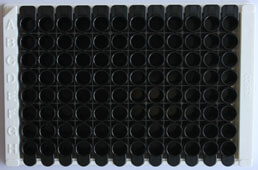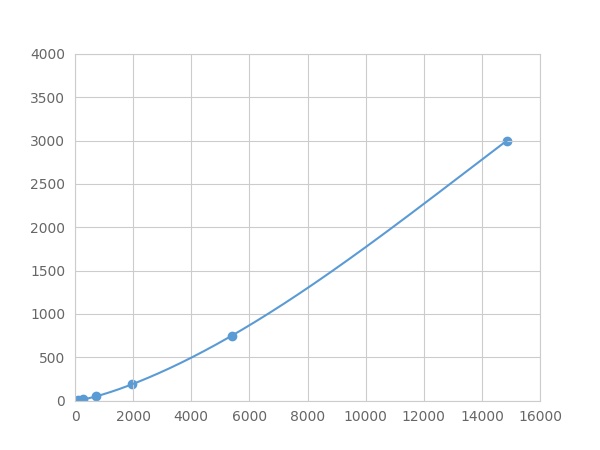Packages (Simulation)

Reagent Preparation

Image (I)
Image (II)
Certificate


Multiplex Assay Kit for Pulmonary Surfactant Associated Protein A1 (SFTPA1) ,etc. by FLIA (Flow Luminescence Immunoassay)
PRL; SFTPA; PSAP; PSPA; SFTP; SPA; COLEC4; PSP-A; SFTP1; SFTPA1B; SP-A1; Collectin-4; Alveolar proteinosis protein; 35 kDa pulmonary surfactant-associated protein; Surfactant Associated Protein A
(Note: Up to 8-plex in one testing reaction)
- Product No.LMA890Hu
- Organism SpeciesHomo sapiens (Human) Same name, Different species.
- Sample TypeSerum, plasma, tissue homogenates, cell lysates, lung lavage fluid, cell culture supernates and other biological fluids
- Test MethodDouble-antibody Sandwich
- Assay Length3.5h
- Detection Range2.93-3000pg/mL
- SensitivityThe minimum detectable dose of this kit is typically less than 0.977 pg/mL.
- DownloadInstruction Manual
- UOM 8Plex 7Plex 6Plex 5Plex 4Plex 3Plex 2Plex1Plex
- FOB
US$ 393
US$ 408
US$ 431
US$ 461
US$ 491
US$ 537
US$ 605
US$ 756
Add to Price Calculator
Result
For more details, please contact local distributors!
Specificity
This assay has high sensitivity and excellent specificity for detection of Pulmonary Surfactant Associated Protein A1 (SFTPA1) ,etc. by FLIA (Flow Luminescence Immunoassay).
No significant cross-reactivity or interference between Pulmonary Surfactant Associated Protein A1 (SFTPA1) ,etc. by FLIA (Flow Luminescence Immunoassay) and analogues was observed.
Recovery
Matrices listed below were spiked with certain level of recombinant Pulmonary Surfactant Associated Protein A1 (SFTPA1) ,etc. by FLIA (Flow Luminescence Immunoassay) and the recovery rates were calculated by comparing the measured value to the expected amount of Pulmonary Surfactant Associated Protein A1 (SFTPA1) ,etc. by FLIA (Flow Luminescence Immunoassay) in samples.
| Matrix | Recovery range (%) | Average(%) |
| serum(n=5) | 87-95 | 91 |
| EDTA plasma(n=5) | 86-101 | 91 |
| heparin plasma(n=5) | 94-101 | 97 |
Precision
Intra-assay Precision (Precision within an assay): 3 samples with low, middle and high level Pulmonary Surfactant Associated Protein A1 (SFTPA1) ,etc. by FLIA (Flow Luminescence Immunoassay) were tested 20 times on one plate, respectively.
Inter-assay Precision (Precision between assays): 3 samples with low, middle and high level Pulmonary Surfactant Associated Protein A1 (SFTPA1) ,etc. by FLIA (Flow Luminescence Immunoassay) were tested on 3 different plates, 8 replicates in each plate.
CV(%) = SD/meanX100
Intra-Assay: CV<10%
Inter-Assay: CV<12%
Linearity
The linearity of the kit was assayed by testing samples spiked with appropriate concentration of Pulmonary Surfactant Associated Protein A1 (SFTPA1) ,etc. by FLIA (Flow Luminescence Immunoassay) and their serial dilutions. The results were demonstrated by the percentage of calculated concentration to the expected.
| Sample | 1:2 | 1:4 | 1:8 | 1:16 |
| serum(n=5) | 84-101% | 93-102% | 87-101% | 91-101% |
| EDTA plasma(n=5) | 84-91% | 85-101% | 97-105% | 97-105% |
| heparin plasma(n=5) | 82-91% | 81-91% | 84-101% | 98-105% |
Stability
The stability of kit is determined by the loss rate of activity. The loss rate of this kit is less than 5% within the expiration date under appropriate storage condition.
To minimize extra influence on the performance, operation procedures and lab conditions, especially room temperature, air humidity, incubator temperature should be strictly controlled. It is also strongly suggested that the whole assay is performed by the same operator from the beginning to the end.
Reagents and materials provided
| Reagents | Quantity | Reagents | Quantity |
| 96-well plate | 1 | Plate sealer for 96 wells | 4 |
| Pre-Mixed Standard | 2 | Standard Diluent | 1×20mL |
| Pre-Mixed Magnetic beads (22#:SFTPA1) | 1 | Analysis buffer | 1×20mL |
| Pre-Mixed Detection Reagent A | 1×120μL | Assay Diluent A | 1×12mL |
| Detection Reagent B (PE-SA) | 1×120μL | Assay Diluent B | 1×12mL |
| Sheath Fluid | 1×10mL | Wash Buffer (30 × concentrate) | 1×20mL |
| Instruction manual | 1 |
Assay procedure summary
1. Preparation of standards, reagents and samples before the experiment;
2. Add 100μL standard or sample to each well,
add 10μL magnetic beads, and incubate 90min at 37°C on shaker;
3. Remove liquid on magnetic frame, add 100μL prepared Detection Reagent A. Incubate 60min at 37°C on shaker;
4. Wash plate on magnetic frame for three times;
5. Add 100μL prepared Detection Reagent B, and incubate 30 min at 37°C on shaker;
6. Wash plate on magnetic frame for three times;
7. Add 100μL sheath solution, swirl for 2 minutes, read on the machine.
GIVEAWAYS
INCREMENT SERVICES
| Magazine | Citations |
| The American Journal of Rhinology & Allergy | Surfactant protein A and D in chronic rhinosinusitis with nasal polyposis and corticosteroid response Ingenta: art00005 |
| American Journal of Rhinology & Allergy | Detection of surfactant proteins A, B, C, and D in human nasal mucosa and their regulation in chronic rhinosinusitis with polyps PubMed: 23406594 |
| Plos one | Staphylococcus aureus and Pseudomonas aeruginosa Express and Secrete Human Surfactant Proteins PubMed: PMC3551896 |
| Plos one | The Detection of Surfactant Proteins A, B, C and D in the Human Brain and Their Regulation in Cerebral Infarction, Autoimmune Conditions and Infections of the CNS PubMed: PMC3787032 |
| Nachweis und Charakterisierung des Oberfl?chenproteins PLUNC (Palate, Lung and Nasal Clone Protein) an der Augenoberfl?che und Bedeutung für das Trockene Auge Opus4:Source | |
| Mol Med Rep | Expression of surfactant protein-A in exhaled breath condensate of patients with chronic obstructive pulmonary disease PubMed: 26707652 |
| Plos One | Serum Levels of Surfactant Proteins in Patients with Combined Pulmonary Fibrosis and Emphysema (CPFE) Pubmed:27337142 |
| PLoS One | The Cerebral Surfactant System and Its Alteration in HydrocephalicConditions. pubmed:27656877 |
| Frontiers in Aging Neuroscience | Correlations of Ventricular Enlargement with Rheologically Active SurfactantProteins in Cerebrospinal Fluid. pubmed:28101052 |
| Frontiers in Aging Neuroscience | Correlations of Ventricular Enlargement with Rheologically Active Surfactant Proteins in Cerebrospinal Fluid PMC5209370 |
| American Journal of Physiology. Lung Cellular and Molecular Physiology | Chronic lung injury and impaired pulmonary function in a mouse model of acid ceramidase deficiency. pubmed:29167126 |
| Molecular biosystems | Metabolic profiling of asthma in mice and the interventional effects of SPA using liquid chromatography and Q-TOF mass spectrometry pubmed:28463380 |
| PLoS One | Evaluation of surfactant proteins A, B, C, and D in articular cartilage, synovial membrane and synovial fluid of healthy as well as patients with osteoarthritis and … Pubmed: 30235245 |
| PLOS ONE | Organic barn dust inhibits surfactant protein D production through protein kinase-c alpha dependent increase of GPR116 Pubmed: 30543664 |
| Molecular Neurobiology | Elevated levels of multifunctional surfactant proteins in cerebrospinal fluid are associated with signs of increased cerebrospinal fluid flow in cranial magnetic … Doi: 10.1007/s12035-017-0835-5 |
| Molecular Neurobiology | Rheologically Essential Surfactant Proteins of the CSF Interacting with Periventricular White Matter Changes in Hydrocephalus Patients–Implications for CSF … Doi: 10.1007/s12035-019-01648-z |
| Antioxidants (Basel) | Oxidative Stress and Inflammatory Mediators in Exhaled Breath Condensate of Patients with Pulmonary Tuberculosis. A Pilot Study with a Biomarker Perspective 34679707 |





